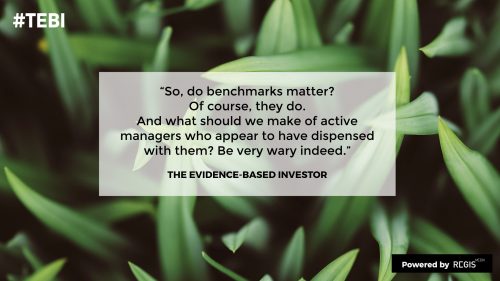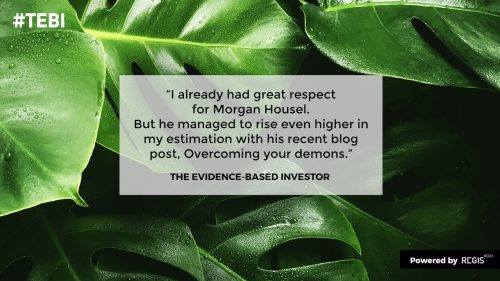First of all, an apology for the long delay since the last Something For The Weekend.
The creative destruction currently going on in the global investing industry is proceeding at a faster pace than I ever dared to imagine. I’ve been so busy over the summer as a consequence that SFTW has sadly fallen by the wayside.
Rest assured, however, that it’s very much business as usual at The Evidence-Based Investor.
Here’s my latest selection for you.
The advice firms dying a lingering death
I’ve had two interesting conversations with financial advisers the week. Both said the same, very telling thing.
Matthew was for many years my own adviser, until he left the profession, fed up largely with its resistance to change. He’s since been on a similar journey to me, discovering the evidence about how investing really works, as opposed to the way the fund industry and most of the financial media want us to think it works.
Why, I asked him, are so many advisers stuck in the past? Why do they continue to put all the emphasis on the investment piece when it’s becoming increasingly commoditised? And why do they still recommend products and strategies that will almost certainly leave their clients worse off in retirement?
The People’s Trust — small step or giant leap?
Although I’m not a fan of active fund management generally, if there’s one active manager I’d like to see succeed it’s Daniel Godfrey.
Daniel is one of the fund industry’s good guys. It was he, you may recall, who was ousted as CEO of the Investment Association, the UK trade body, for daring to suggest — shock, horror — that members sign up to a statement of principles, requiting them, among other things, to put consumers’ interests first.
Let’s face it. Most of us, given a choice between lying low in return for an annual salary of £460,000, and risking it all by taking an ethical stance, would opt for the former. Daniel didn’t. He bit the hand that fed, and in doing so, I suspect, he played a part in persuading the Financial Conduct Authority that it really needs to tackle the opacity and conflicts of interest that continue to dog the asset management sector.
The problem with performance-based fees
There’s never been a better time to be an investor. Fees are coming down all the time. In most cases, the fee reductions are on passively managed funds, which were relatively very cheap already. But occasionally, thanks largely to competition from passive funds, the industry’s cutting the cost of active investing too.
The other day, for example, the German fund company Allianz Global Investors has announced the launch of a number of funds that will only charge investors a management fee if they beat their benchmarks.
AllianzGI isn’t the first to go down the route of performance-based fees. For example, New York City-based Alliance Bernstein and Orbis Investments in the UK have also agreed to waive their fees if they don’t beat the market (which is, let’s remember, the only logical reason for using actively managed funds in the first place).
Darling, benchmarks are soooo last lear
I don’t know if you’ve noticed, but the active fund industry seems to have a bit of a downer on benchmarks lately. “We’re not tied to a particular benchmark,” we increasingly hear managers say. “We want the freedom to invest in anything we want to. You can’t do that with passive funds!”
So, do benchmarks matter? Of course, they do. And what should we make of active managers who appear to have dispensed with them? Be very wary indeed.
Every profession and every industry I can think of uses benchmarks. There are league tables to show us which schools have the best and worst exam results, which hospitals the highest mortality rates, which police forces the lowest crime detection rates. Cars are rated for safety, emissions and fuel efficiency, restaurants for food hygiene, and owners of rental property all want to avoid below-average rating on TripAdvisor. Why should asset managers who, let’s face it, we entrust with our life savings, be spared this kind of scrutiny?
Liberation comes from admitting we’re wrong
“One of the greatest frustrations for me,” writes the investment author Larry Swedroe in his latest blog post, “is that, given the overwhelming amount of evidence against active management, a majority of investors keep playing a loser’s game.”
I’ve written about this on TEBI many times, but what is Larry’s take on it? In fact he presents four explanations.
The first, he suggests, is that “the education system has totally failed the public”. Ideally, young people would learn about investing and the financial markets in school and college. In the event, “many obtain their ‘knowledge’ about investing from the very institutions — Wall Street and the financial media — that don’t have their interests at heart, because the winning strategy for them is when investors play the game of active investing.”
Everyone’s struggling with something
I already had great respect for Morgan Housel. For years he’s been one of the most articulate financial writers on the web. I’ve also learned, from the few conversations we’ve had at evidence-based investing conferences, that he’s intellectually razor sharp.
In it, he discusses stuttering, a condition that affects about 20% of children, though most outgrow it by the age of five. Just 0.1% stutter into adulthood. Morgan is one of them, and so, as it happens, am I.
Whether or not you stutter yourself or have a friend or loved one who does, I strongly urge you to read his article. Not only does he precisely describe what it feels like to stutter (or the sense that you’re about to), but he also explains how, over the years, he’s largely managed to control it.
Also worth reading
Personal finance
There is no perfect retirement spending strategy (Mike Piper)
The top five ways to manage your money (White Coat Investor)
If others are counting on you, life insurance is essential (Justin Castelli)
To feel better, spend money on saving time (Ashley Whillans & Michael Norton)
The first time in your adult life the market drops over 25% is hard (James Osborne)
“Risk is the payment we make for a chance to reach our aspirations” (Meir Statman)
The markets
The “passive investing bubble” meme is nonsense (Henry Ma)
Why this evidence-based investor loves reading about the markets (Ben Carlson)
UK-specific
Hargreaves Lansdown’s Wealth 150 is no better than a coin toss (Alan Miller)
At last. Competition authorities to investigate investment consultants (Lucy Burton)
The active management lottery is costing pension scheme members a fortune (Josephine Cumbo)
Advisers
Should financial advisers write a book? (Michael Kitces)
Enjoyed BACK2Y or Disrupt Advice? You’ll enjoy this too (Life-First Advisor)











